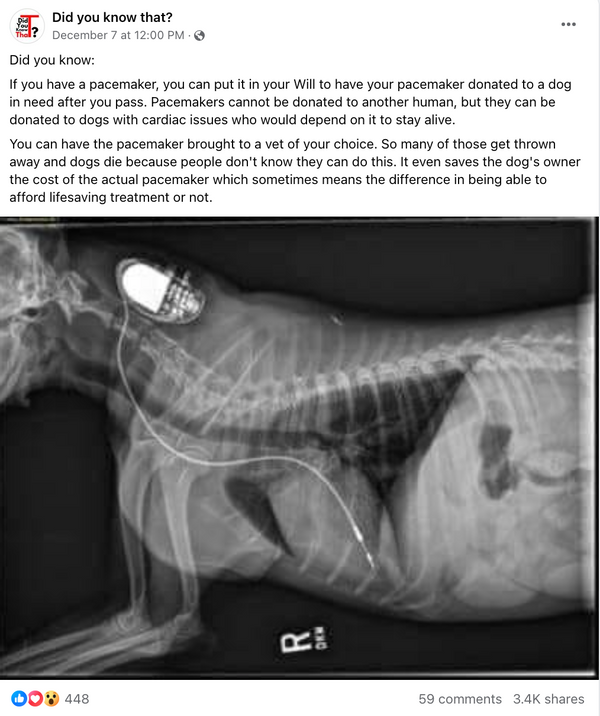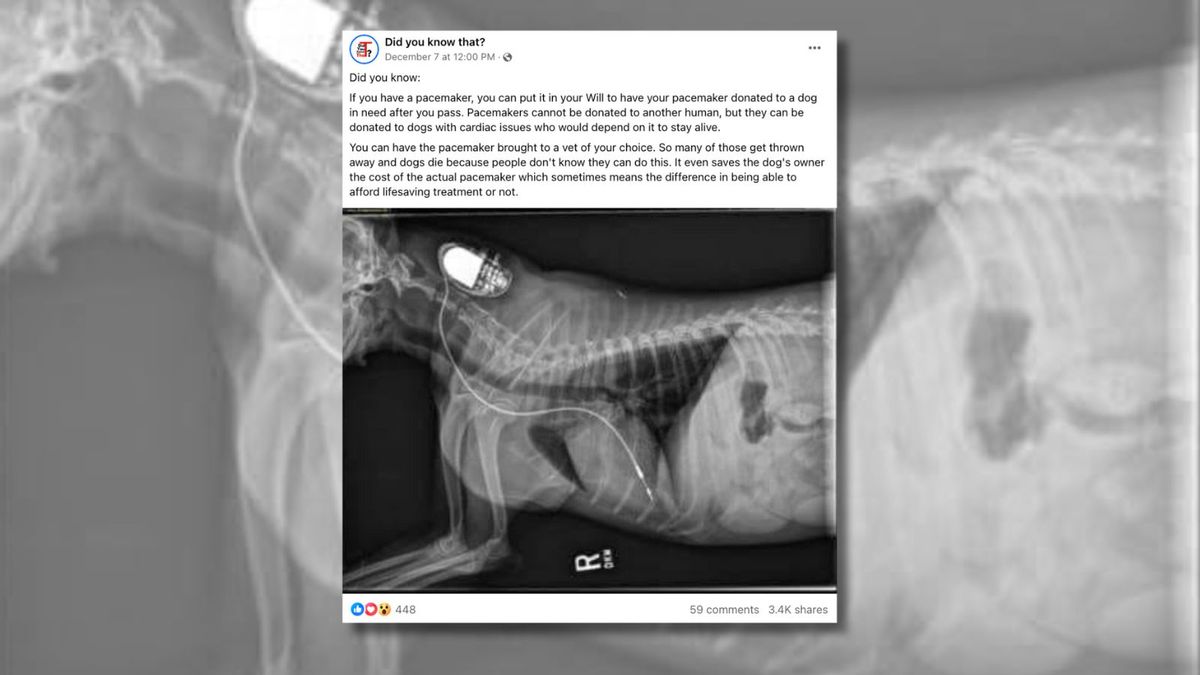In early December 2023, readers asked us via email if it was true that pacemakers can be "donated to dogs with cardiac issues who would depend on it to stay alive." The same claim has been shared online multiple times on various social media platforms such as X, Facebook, and iFunny. For instance, on Dec. 7, 2023, a post went viral on Facebook, claiming that "If you have a pacemaker, you can put it in your Will to have your pacemaker donated to a dog in need after you pass."

(Facebook profile Did you know that?)
The same claim was also spread on X (formerly Twitter) informing other users that "It even saves the dog's owner the cost of the actual pacemaker which sometimes means the difference in being able to afford lifesaving treatment or not."
Did you know:
If you have a pacemaker, you can put it in your Will to have your pacemaker donated to a dog in need after you pass. Pacemakers cannot be donated to another human, but they can be donated to dogs with cardiac issues who would depend on it to stay alive. #dogsofx— SheltieLeesi17 (@SLeesi17) December 2, 2023
Our research confirmed that that individuals with pacemakers can indeed donate these life-saving devices to dogs after their passing, and therefore we have rated the claim as True.
For instance, the University of Missouri Veterinary Health Center's website informed that "MU veterinary cardiologist recycles donated pacemakers — from both pets and people — to maintain the rhythm of life for canine patients." Moreover, the article underscored that donating pacemakers reduces veterinary costs and provides a lasting benefit to dogs in need.
“There is actually no difference between human and canine pacemakers,” says Stacey Leach, DVM, an assistant teaching professor and researcher at MU’s College of Veterinary Medicine. “We use the same equipment, the same technology. Oftentimes, the appliances we use for our canine patients are essentially human-grade equipment that was donated to us.”
[...]
“We also receive — and encourage — donations of pacemakers that have outlived a patient, whether that patient was a dog or a human,” Leach says.
It continued (emphasis ours):
“Within the cardiology community, there’s an organization that serves as a repository for donated pacemakers, but there are so many cardiologists worldwide who are doing this procedure that they are very nearly always sold out,” Leach says. “So, unfortunately, we are becoming increasingly dependent on people donating pacemakers directly to us, or purchasing brand new pacemakers, which can run several thousand dollars for the entire setup.
University of Georgia’s College of Veterinary Medicine runs a similar initiative, namely a "Pacemaker Donation Program," that "provides heart patients at MCNH (The Medical Center, Navicent Health) the option of donating their used pacemakers to canine heart patients at UGA." The article on University of Georgia’s website informed (emphasis ours):
Like humans, dogs are at risk for developing cardiac complications that can interfere with length and quality of life. Knowing that surgeries to address heart problems in dogs can be very expensive, one Navicent Health nurse decided to take action to help dogs in need of cardiac care.
“The similarities between how animals and humans are treated for certain diseases are very strong. When I was studying to become a nurse 20 years ago, I learned that pacemakers for human beings could be utilized in dogs, as well,” said Terri Matula, a board certified cardiovascular nurse at MCNH.
What's more, Medtronic, a medical device company, published an article with the title "Pets and pacemakers: best friends a while longer," about a miniature schnauzer that received a pacemaker donated by the company. It underscored that "therapies used in humans can also help animal patients."
Medtronic donated Tara’s pacemaker through a nationwide nonprofit called CanPacers. It’s a medical device repository sponsored by the American College of Veterinary Internal Medicine and maintained at North Carolina State University.
Its mission is to provide cardiac pacemakers and leads to veterinary patients. Medical device companies donate the devices, which were originally intended for human patients, and CanPacers oversees distribution to veterinary cardiology programs around the United States.
Finally, while some social media posts also claimed that "pacemakers cannot be donated to another human," it remains a complex issue. An article published by the University of Michigan Medical School with the title "Helping hearts: Team sends much-needed pacemakers to Ukraine" informed that in 2022 Ukraine received refurbished pacemakers from the university's My Heart Your Heart program. However, a 2012 study on the topic underscored that "while preliminary data suggest safety and efficacy of pacemaker reuse for devices that have adequate remaining battery life, to date implantable pacemakers are not approved for reuse in the U.S. or European Union." A Reuters' article from the same year read:
People in developing countries with heart problems may not be able to afford new pacemakers, but a new study suggests devices removed during autopsies may have enough remaining battery life to be donated and used again.
Researchers found that of 334 autopsies preformed at the University of Pennsylvania between February 2009 and July 2011, 27 pacemakers and implantable cardioverter-defibrillators (ICDs) were recovered. Of those, eight devices had at least four years of battery life remaining.
It also underscored that the U.S. Food and Drug Administration considers pacemakers to be single-use devices.
In January 2021 we published a fact check on a similar topic, investigating whether a study found that an iPhone 12 can disable a cardiac rhythm management device.

